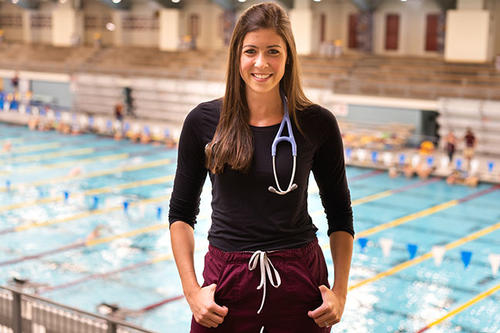
Chloe Portela was 11 when she underwent surgery to correct a genetic malformation of the sternum and rib cage that left her chest caved in and made bouts of pneumonia and bronchitis regular ordeals.
The procedure was successful, yet significant pain lingered during her recovery, puzzling her doctors in Kansas City who wondered whether her discomfort might be psychological. But the nurses on Portela’s care team, having seen her tenacity up close on a daily basis, pushed for more lab tests.
Sure enough, the culprit was a staph infection that would require a six-month recovery.
“They were just my biggest advocates, and they helped me get the care that I needed,” Portela says of her nurses, a group that has inspired to pursue a career in the field through the School of Nursing’s Master of Nursing program.
As an undergraduate, she opted to focus on her swimming career for the Golden Gophers while majoring in child psychology. She comes from a family of swimmers; her dad swam for Puerto Rico at the 1984 Summer Olympics, her mom made the United States Olympic Trials, and both of her brothers also swam for the Gophers. Portela specialized in the butterfly and was part of four straight Big Ten titles while also swimming for the Puerto Rican national team.
Her experiences in the hospital shaped her career ambitions. She volunteered and interned at her local hospital in Lawrence, KS, and continued to seek out opportunities in health care settings as an undergraduate, first by connecting with children with life-threatening illnesses through the nonprofit HopeKids and then at the University of Minnesota Masonic Children’s Hospital.
After she graduates in December, Portela hopes to work in a neonatal intensive care unit, with an eye toward becoming a neonatal nurse practitioner. She says she wants to help families through their most trying times by building genuine connections, and she’s proof of the impression nurses can make on a patient.
“I think it’s really important to get to know your patient,” she says. “That’s how I became interested in the field. My nurses got to know me for me, not just a chart.”
- Categories:
- Health




